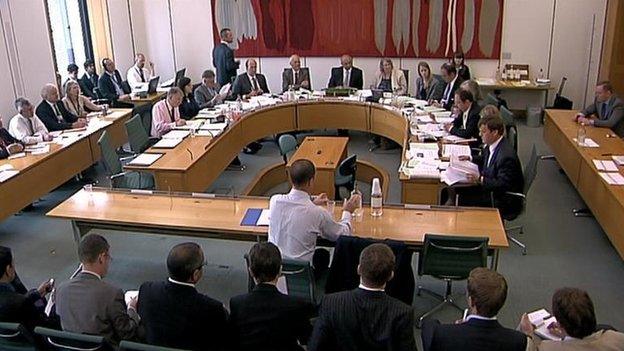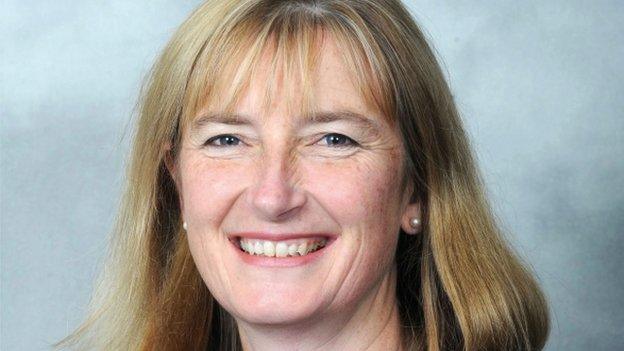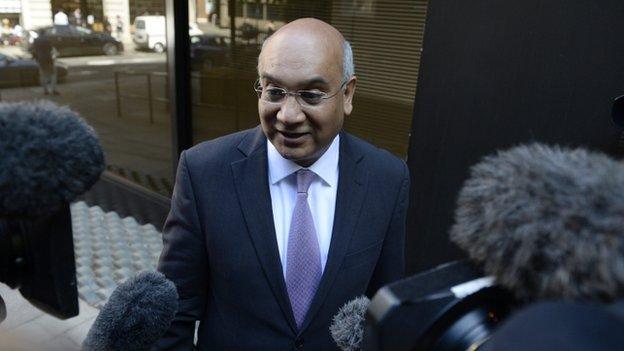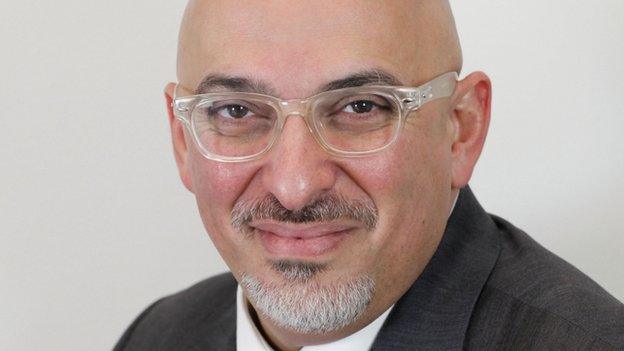Who will run the Select Committees?
- Published

Sometime during the 2001-05 Parliament an MP complained to me "in a select committee, no-one can hear you scream". *
Since then the power of the Commons network of committees shadowing government departments or pursuing cross-cutting issues has risen sharply.
Which is why dozens of MPs were campaigning for their chairs, even before the formal relaunch of the committee system.
Perhaps it was the savaging the Treasury Committee handed out to the titans of the City of London after the Credit Crunch in 2007, perhaps it was the need for MPs to justify their existence in the wake of the expenses scandal, external, but the committees somehow discovered the self-confidence to bare their teeth across the last two parliaments.
During the coalition years, they were frequently a serious influence on government policy - the Health Committee on NHS reform, the Treasury Committee and its cousin the Parliamentary Commission on Banking Standards, external on cleaning up the financial services industry.
The question now is whether they have passed the zenith of their influence, and will carry less clout in holding a majority government to account. Maybe.
But the sheer number of MPs, ambitious, independent-minded types, running to chair them suggests otherwise.
Trouble making
The system works like this: first there is a share-out of committee chairs between the three largest parties in the House.

Sarah Wollaston was a critic of NHS reform
Some, like Public Accounts and Backbench Business, are reserved to the Opposition, but the rest are parcelled out in proportion to the parties' strength.
The major changes in the latest division of the spoils are that the Conservatives will now take the chair of the Justice Committee (previously held by Lib Dem veteran Sir Alan Beith) while the SNP will take two chairs: Scottish Affairs and Energy and Climate Change.
Then elections are held in which all MPs vote, for example, for the best Conservative to chair a Conservative-allocated committee like Treasury or Education.
And where several candidates are in the running, this means that the winner will be the one with the widest appeal to MPs from other parties.
In the last Parliament this led to accusations of Opposition trouble-making, when by-elections were held to replace the Conservative chairmen of the Health and Defence committees, and on each occasion the winner was a candidate with a maverick reputation - for Health, Dr Sarah Wollaston, an initial critic, external of the government's NHS reforms, for Defence, Rory Stewart, who defies categorisation.
By the time of those elections, of course, the MPs had a pretty good idea of the people they were choosing.
The difference now is that there are 182 new MPs in the Commons, who will not necessarily know much about the candidates before them, and who may, therefore vote on name recognition.
The older hands - now beginning to enjoy some of the luxurious perks of Commons seniority - may vote for the most accomplished parliamentarians, or at least that is what the optimists hope. We shall see.
Candidates
Which brings us to the races themselves.
Some key committee chairmen have performed so effectively that they face little challenge.
Andrew Tyrie, Sarah Wollaston and Bernard Jenkin seem to be in that category, at the moment. Mr Jenkin's Public Administration Committee will have constitutional affairs added to its brief, following the decision to wind up the dedicated Political and Constitutional Reform Committee.

Is Keith Vaz's position as chairman of the Home Affairs Committee under threat?
One sitting chairman who may face a challenge seems to be Keith Vaz on the Home Affairs Committee, where a couple of strong rivals, including an ex-minister, are rumoured.
And there are some hot contests elsewhere: with Michael Gove metaphorically (but not literally) on the woolsack as lord chancellor and secretary of state for justice, and with reform to the UK's relationship with the European Court of Human Rights (ECHR) mooted by the government, the Justice Committee will be in the limelight.
The contenders for the chairmanship include Jonathan Djanogly, a former justice minister, and backbenchers John Howell and David Burrowes, best known for leading the Commons opposition to gay marriage in the last parliament.
Incidentally, the chairman of the Joint Human Rights Committee, which may also have something to say on the ECHR, will not be directly elected - as a cross-parliament committee of MPs and Peers, its members will elect their chairman.

Nadhim Zahawi is a contender for the Foreign Affairs Committee
There are some intriguing names in the race for the Foreign Affairs Committee, with Middle East expert Nadhim Zahawi and John Baron, who helped engineer crucial backbench votes on non-intervention in Syria and on an EU referendum, among the contenders.
There is also quite a race building up for the Culture, Media and Sport Select Committee, which will among other things keep an eye on BBC Charter renewal, where former minister Damian Green, and backbench philosopher-king Jesse Norman are in the running.
And, intriguingly, Graham Stuart, previously chairman of the Education Committee is seeking a lateral move there, as well.
New committees
There will also be two new committees for MPs to aim at - a Women and Equalities Committee is being created (with a Conservative chairman) and there will also be a Petitions Committee, which will co-ordinate the parliamentary response to public petitions, organising debates or referring to other select committees as appropriate.
Nominations for chairs of select committees close on Wednesday, with the ballot to be held a week later.
Then the party groups will elect their quota of ordinary members to each committee, also by secret ballot.
The number of seats each party gets on each committee is allocated in proportion to their representation in the House of Commons as a whole.
Only after they are in place will the system swing into action.
So those committees capaable of quick decision-making might just manage to get a few hearings under their collective belts before the Commons rises for its summer recess on 21 July.
* For those not of a certain vintage, that MP's quote was a send-up of the slogan for the first Alien movie.

The Select Committees:
Business, Innovation and Skills: Chaired by Labour
Communities and Local Government: Labour
Culture, Media and Sport: Conservative
Defence: Conservative
Education: Conservative
Energy and Climate Change: Scottish National Party
Environment, Food and Rural Affairs: Conservative
Environmental Audit: Labour
Foreign Affairs: Conservative
Health: Conservative
Home Affairs: Labour
International Development: Labour
Justice: Conservative
Northern Ireland:Conservative
Petitions: Labour
Procedure: Conservative
Public Accounts: Labour
Public Administration & Constitutional Affairs: Conservative
Science and Technology: Conservative
Scottish Affairs: Scottish National Party
Standards: Labour
Transport: Labour
Treasury: Conservative
Welsh Affairs: Conservative
Women and Equalities: Conservative
Work and Pensions: Labour
